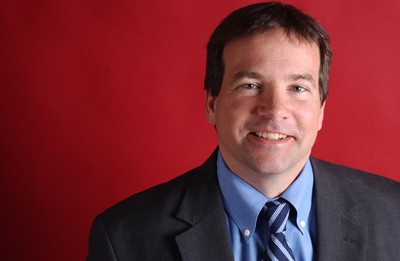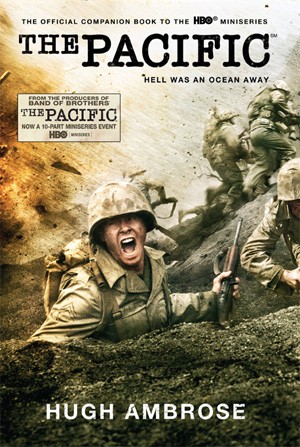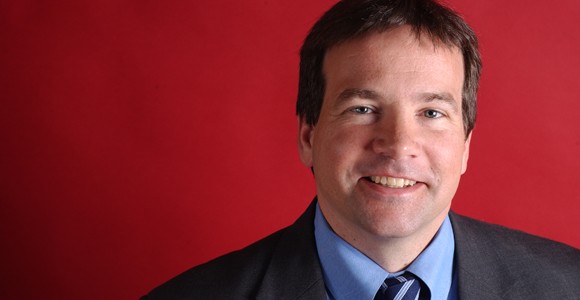Hugh Ambrose Interview: Author Pens 'The Pacific' After Promise to His Father, Stephen
Written by Melissa Parker, Posted in Interviews Authors
Noted historian Hugh Ambrose wrote The Pacific, a companion to the HBO miniseries executive produced by Tom Hanks, Steven Spielberg, and Gary Goetzman, and he served as historical consultant on the project. In the book, the author focuses on the real life stories of five marines who put their lives on the line for our country, fighting in the Pacific Theater of Operations in World War II.
Ambrose came by his love for historical events honestly, growing up in a household with a history professor. His father, acclaimed biographer and historian Stephen Ambrose, has penned several books on the subject; Band of Brothers, D-Day, The Wild Blue, and Citizen Soldiers just to name a few.
"I wanted to find a different way to do it. I tried hard to learn as much from him as I could and all of that to the best of my ability is in the book."
Melissa Parker (Smashing Interviews Magazine): Hugh, you’re out there in Montana, aren’t you?
Hugh Ambrose: Yes I am.
Melissa Parker (Smashing Interviews Magazine): Where were you born?
Hugh Ambrose: I was born in Baltimore and grew up in New Orleans.
Melissa Parker (Smashing Interviews Magazine): You have four siblings. Is anyone else in the family interested in history or writing?
Hugh Ambrose: Both of my sisters are writers, one in history and the other is a professor of orientation and mobility for the blind and visibly handicapped. She is working on a book. My cousin, Edie, is a professor of history who is also writing a book.

Hugh Ambrose (Courtesy of Penguin Group)
Melissa Parker (Smashing Interviews Magazine): There appears to be a writing gene in your family.
Hugh Ambrose: We have a terrible inability or a lack of coming up with a different career option, I guess (laughs).
Melissa Parker (Smashing Interviews Magazine): Have you always been interested in history?
Hugh Ambrose: Yeah, always … and always wanted to be a writer. Well, you know, the practice of history is speaking and leading tours, and eventually when you find the right thing … writing. So I think all those things are part of being a historian. I think that all historians are eventually trying to find the thing that needs to be written.
Melissa Parker (Smashing Interviews Magazine): Your dad, Stephen, began writing The Pacific and you took over when he passed away?
Hugh Ambrose: No, I’d been working for him for more than a decade. We spoke a lot. If we weren’t working in the same office then we spoke a couple of times a day by phone about everything.
I believe we were actually down in his office when he said he had done everything he could do with the European Theater. He said that other historians were going to come along and do great work, but he felt he had come to the end of it.
I suggested we take a look at the Pacific (Theater) to see if there was something there. He liked that idea so we began that in 2000 together. My job was to develop the original research that would sustain a Stephen Ambrose book. At that point he was so famous that a few well placed sidebars in stories and we received 80 boxes of diaries, letters, memoirs, oral histories, photographs, just a magnificent collection.
Melissa Parker (Smashing Interviews Magazine): I’ll bet that took a long time to rummage through.
Hugh Ambrose: Well, yeah, of course much of it was unusable for one reason or another. So along with what we received, there was much work to target these people from certain units we had an interest in and conduct oral histories. We ended up doing a documentary with Steven Spielberg called Price for Peace that plays in the national World War Two museum.
In 2002 when my dad was diagnosed, he said, “It’s just too big. I can’t do all of that.” So we set it aside because he had some other things he wanted to do before he passed away. It was about a year later when I had the opportunity to get back to work on it … it was something I told him I wanted to finish. But, what was great was that I didn’t do it the way that he would have done it. If you look at D-Day or Citizen Soldier or some of his master works on the European Theater of Operations in World War II, he’s weaving together hundreds of voices to give you this narrative that the experiences, the reality, and the strategic situation – all of those things are bound together.
I wanted to find a different way to do it. I tried hard to learn as much from him as I could and all of that to the best of my ability is in the book.
Melissa Parker (Smashing Interviews Magazine): Many people just associate the European Theater with the “real” war. But, as you noted in the book, the Japanese were more brutal than the Germans.
Hugh Ambrose: Unquestionably. I mean, German medics were treating soldiers on either side. When men surrendered the Germans treated them humanely. That’s not to say that it wasn’t extremely dangerous and violent, all of the things that war is. It’s just that, “Okay you’re surrendered, drop your weapons and come this way,” never happened in the Pacific Theater. In fact, the reverse is true.
The wounded Japanese would lay still and as the Americans approached, they would wait until they were close enough to try to kill a few more Americans. What you see there is not just the casualties but also the hatred that the men had for their enemy. But this made no sense because by 1944/45 it was self evident to everyone that the Japanese were not going to win the war.
Melissa Parker (Smashing Interviews Magazine): The Germans treated POWs better than the Japanese also.
Hugh Ambrose: The men in Japanese camps were 20 times more likely to die in captivity than men in German camps. The Japanese POW camps were an atrocity … a crime against humanity.
It was a very different experience in a German camp, particularly for pilots because the Luftwaffe had a sort of “knights in shining armor” view of themselves and the gentlemen who flew airplanes. So that was even another step up. But at least there was a sense that the Germans were not going to kill these people or allow them to die through neglect or prevent them from having water.
You had Japanese camp commanders who were shutting off the water supply as retaliation. Men who were weak could not survive that. Humans in general can’t survive that, but particularly men who were already weak and malnourished. You didn’t have that kind of mentality in the German camps. I don’t want to pretend that being in a German POW camp was anything short of a difficulty, but it was different. The camps in the Philippines were some of the worst in military history.
Melissa Parker (Smashing Interviews Magazine): What was the experience like working with Steven Spielberg and Tom Hanks on the HBO miniseries The Pacific?
Hugh Ambrose: Well, it doesn’t get any bigger (laughs). In terms of being a small part of a major miniseries, this is as big as it gets. Steven called me and asked if I would work on the project in 2003. That was a great thrill for me. We had worked on this documentary, Price for Peace, and a few other small things. I’d been involved in certain ways, but not as a historian, with Band of Brothers and Saving Private Ryan. I had been my father’s agent so there was a relationship there. He had also spent a couple of years working with my father trying to do a book on the Pacific war.
 Steven was kind enough to allow me the chance to work with Bruce McKenna, who was at that time the screenwriter. Now Bruce is the co-executive producer and there are a number of screenwriters. Bruce and I spent a few years working on this under Steven, Tom, and Gary Goetzman’s supervision. We went down a lot of blind roads trying to figure out what was going to work.
Steven was kind enough to allow me the chance to work with Bruce McKenna, who was at that time the screenwriter. Now Bruce is the co-executive producer and there are a number of screenwriters. Bruce and I spent a few years working on this under Steven, Tom, and Gary Goetzman’s supervision. We went down a lot of blind roads trying to figure out what was going to work.
The miniseries was an amazing thing to shoot. I think everybody who worked on the project knew that the bar was set extremely high. We were working with the best people, we had a huge budget, and we were trying to do what Band of Brothers had done in terms of integrity and of just phenomenal filmmaking.
In terms of working with those guys, everybody knew their commitment to getting it right, to telling the truth, and I was fortunate to have the chance to be working with them.
Melissa Parker (Smashing Interviews Magazine): It was filmed in Australia?
Hugh Ambrose: Yes, there were a number of massive sets built outside of Melbourne, Australia. I would walk onto the set with the director, head screenwriter, the director of photography, and maybe a couple of other people. They would begin to look for their shot, where they were going to stage certain parts of the next episode.
Melissa Parker (Smashing Interviews Magazine): You were the historical advisor?
Hugh Ambrose: My job was just to keep quiet in case someone had a question (laughs). The other people were really just being quiet as well as the director and his photography director discussed the shot. They don’t shoot anything in order and use numbers because they’re talking about different scenes. Even though I understand the story as well as anyone, if not better, I’m still thinking, “Now 25-A is what?”
The director looks at the cameraman and says, “I like this one for the first shot tomorrow.” The cameraman nods his head, they tell us to come on, and head us toward whatever we might start on the day after or the next sequence of shots. If I turned around I’d see an assistant with a big colored stake. He’d look for the director’s footprint and he’d put that stake right where the big toe had been when the director said, “I like this.”
Then from around this huge compound many people would come and dress the set. That is to say, to burn off the vegetation that had been put there so that tomorrow it’s still freshly burnt. The stunties would come in and begin preparing places for guys to fall. People would begin building cameras and easy ups where the actors would stay out of the sun when we weren’t shooting. It was just this massive wave of people coming to do their jobs.
There was no director yelling at people, nobody throwing fits, just highly trained professionals who had been waiting for the moment to do the next part of their job. When you get to work with people like that, you really fell lucky. There are many script changes and questions that come up as you create from words on a page, a three dimensional reality that a historical advisor can help the director and writers with, so I tried to do my best to hold up my end of things.
Melissa Parker (Smashing Interviews Magazine): I was fascinated reading about Manila John (John Basilone) who was killed during the Battle of Iwo Jima. He has to be the true definition of an American hero.
Hugh Ambrose: It’s hard not to read his story and not just like him. Of course, he makes such an interesting choice about how he’s going to live his life. So much legend, inaccuracy, and general BS has built up around him in the decades since he passed away. I felt honored to get to peel back all of that trash to get to what he really was, or at least closer to what he was. I think he was special for many reasons, but John was also a good guy. He knew how he wanted to live his life.
I don’t think John came back to the Marine Corps, as many writers have written, to fight on Iwo Jima or that he had some idea about what was going to happen to him. He just knew that was the life that made sense to him. He would go into combat if called to do so. He was smart enough to know that the other options either didn’t make him happy or he would not have been good at them. I mean, this is a guy that dropped out of the 8th grade. The idea that the Marine Corps was going to put him in an office in Washington, D.C. where he would keep banker’s hours … well, that just didn’t make sense to him.
John’s supreme courage is extremely well documented. His actions were witnessed by many people who wrote about them at the time. This was a guy who, when the shit hit the fan, stepped forward.
Melissa Parker (Smashing Interviews Magazine): Hugh, you have recently addressed the accusation that your dad was guilty of “fabricating” a relationship with former President Eisenhower. Do you think that this and the plagiarism accusations have damaged your dad’s good name?
Hugh Ambrose: Well, I do think that … yes, I think that when people make these kinds of accusations and charges that it can be damaging to a person’s reputation.
My father made some mistakes. There are those who have really made the most of them and exaggerated them. The thing that keeps … people read D-Day or Undaunted Courage or any of his books and can see the beauty and power of his writing. They can feel the precision of his analyses and understand and put these things into context.
At the end of the day, the reader can look at that and make their own decision. That is the arena that historians live in so that is fair enough. My father admitted to having made some mistakes, but again, I think that they’ve been exaggerated and that really is unfortunate.
Melissa Parker (Smashing Interviews Magazine): Stephen Ambrose was a wonderful author and historian.
Hugh Ambrose: Well, thank you very much. I appreciate that.
Melissa Parker (Smashing Interviews Magazine): Will you be working on another book?
Hugh Ambrose: I hope so. I have a couple of ideas, but it’s going to take some time. I essentially spent 9 years working on The Pacific. Once I figured out how I was going to do it, I was excited every day to try to finish the book. The challenge to do something that was a serious non-fiction work of history was extremely difficult, as it is for anyone who approaches this topic. Whatever I end up taking on again I want to feel the same way. It’s a very long and difficult process and there’s no way of knowing at the end what’s going to happen.
For the longest time we worked on this miniseries without any real clear sense that it was going to get made. More projects fail in Hollywood than succeed. So you take that gamble. But, I just decided, whether it gets made or not I was going to finish the book. I probably won’t do another book about World War II. For many reasons, I feel it is important for me to move on.
Melissa Parker (Smashing Interviews Magazine): Is there anything in the works for another miniseries?
Hugh Ambrose: Yeah, HBO is working on some things that I’m involved with, but I don’t know what will become of them (laughs).
© 2010 Smashing Interviews Magazine. All rights reserved. This material may not be published, broadcast, rewritten or redistributed without the express written consent of the publisher.

